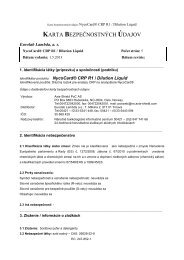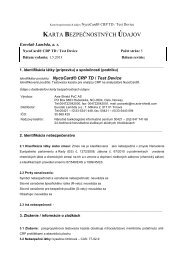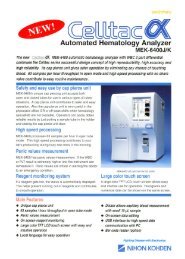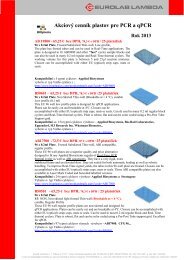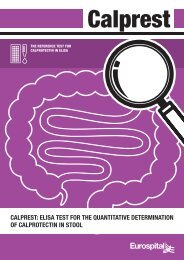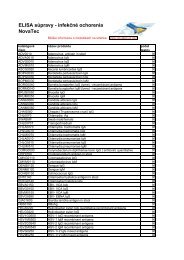Diagnostics Division of AGROLABO SpA group
Diagnostics Division of AGROLABO SpA group
Diagnostics Division of AGROLABO SpA group
Create successful ePaper yourself
Turn your PDF publications into a flip-book with our unique Google optimized e-Paper software.
The EHRLICHIA IC test is a chromatographic<br />
immunoassay for the qualitative detection <strong>of</strong><br />
antibodies in samples <strong>of</strong> serum, plasma or whole<br />
blood, to aid in the diagnosis <strong>of</strong> canine Ehrlichiosis.<br />
The test employs a highly specific and purified<br />
recombinant antigen, a dominant antigen <strong>of</strong><br />
Ehrlichia canis, specifically developed to<br />
accurately detect E. canis antibodies in blood<br />
specimens.<br />
This highly reliable assay is practical and easy to<br />
use. Simply add 1 drop <strong>of</strong> serum, plasma or whole<br />
blood, followed by 1-2 drops <strong>of</strong> sample diluent to<br />
the sample test pad, and wait approximately 5<br />
minutes to read the results. Screening for infection<br />
couldn’t be easier!<br />
Available pack sizes:<br />
Specific for:<br />
Pathology:<br />
Method:<br />
Analyte:<br />
Capture molecules:<br />
Sample:<br />
Total run-time:<br />
Hands-on time:<br />
Result reading:<br />
Additional materials:<br />
Storage temperature:<br />
Shelf life:<br />
Instructions:<br />
1, 2, 5, 10 test kits<br />
Dogs<br />
Ehrlichia canis<br />
Immunochromatographic<br />
Antibody<br />
Recombinant antigen<br />
Serum, plasma, whole blood<br />
5 -10 minutes<br />
1 minute<br />
Visual<br />
All materials/instruments provided<br />
Room temperature (18-25°C)<br />
12 months from production date<br />
Multilingual<br />
Test Validation<br />
A comparative study between indirect<br />
immun<strong>of</strong>luorescence (IFA) and Ehrlichia IC, showed the<br />
following results:<br />
IFA titre 1:320 = neg. 0% - pos. 100%<br />
Canine ehrlichiosis is an infectious disease caused by Ehrlichia canis, a micro-organism that<br />
infects monoucleate cells. This organism is primarily transmitted by the Rhipicephalus<br />
sanguineus tick, the main vector and the main reservoir <strong>of</strong> infection. The disease can also be<br />
transmitted to dogs through blood transfusions.<br />
The clinical symptomatology <strong>of</strong> dogs with Ehrlichiosis is rather generic. There are two stages <strong>of</strong><br />
ehrlichiosis, each varying in severity. The acute phase <strong>of</strong> the disease is not usually life<br />
threatening and infected animals will either become asymptomatic carriers, or progress to the<br />
chronic stage. The chronic phase represents a stage <strong>of</strong> infection in which the animal may<br />
show signs <strong>of</strong> lameness, neurological and ophthalmic disorders, kidney disease, and anemia<br />
and other blood disorders.<br />
Diagnosis is achieved most commonly by serologic testing <strong>of</strong> the blood for the presence <strong>of</strong><br />
antibodies against the Ehrlichia organism. Such testing is important during the chronic phase<br />
<strong>of</strong> the illness.<br />
12






